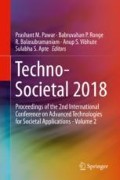Abstract
Globally manufacturers are stressed to simultaneously fulfil the need for higher productivity, economy, better surface integrity and green manufacturing. Hence keeping a broad view of above needs, this paper investigates the surface residual stresses in high-speed turning of Inconel 718 by using PVD coated carbide cutting tools at an optimal cutting speed, feed and depth of cut under completely eco-friendly machining environments viz. dry, water vapour and chilled air. Additionally, the emphasis has been also given on understanding the efficacy of methods of supplying the eco-friendly cutting fluids through the external nozzle as well as internally through tool holder. Results reveal that usage of water vapour leads to better surface integrity in terms of advantageous compressive residual stresses and also further leads to cleaner machining. Further supplying the cutting fluid internally through tool holder than externally through the nozzle is much beneficial in lowering the tensile residual stresses.
Access this chapter
Tax calculation will be finalised at checkout
Purchases are for personal use only
References
Thakur DG, Ramamoorthy B, Vijayaraghavan L (2009) Machinability investigation of Inconel 718 in high-speed turning. Int J Adv Manuf Technol 45:421–429
Pawade RS, Joshi SS, Brahmankar PK, Rahman M (2007) An investigation of cutting forces and surface damage in high-speed turning of Inconel 718. J Mater Process Technol 192–193:139–146
Pawade RS, Joshi SS, Brahmankar PK (2008) Effect of machining parameters and cutting edge geometry on surface integrity of high-speed turned Inconel 718. Int J Mach Tool Manu 48:15–28
Wang ZY, Rajurkar KP (2000) Cryogenic machining of hard-to-cut materials. Wear 239:168–175
Arunachalam RM, Mannan MA, Spowage AC (2004) Residual stress and surface roughness when facing age hardened Inconel 718 with CBN and ceramic cutting tools. Int J Mach Tool Manu 44:879–887
Arunachalam RM, Mannan MA, Spowage AC (2004) Surface integrity when machining age hardened Inconel 718 with coated carbide cutting tools. Int J Mach Tool Manu 44:1481–1491
Devillez A, Le Coz G, Dominiak S, Dudzinski D (2011) Dry machining of Inconel 718, workpiece surface integrity. J Mater Process Technol 211:1590–1598
Pusavec F, Hamdi H, Kopac J, Jawahir IS (2011) Surface integrity in cryogenic machining of nickel based alloy – Inconel 718. J Mater Process Technol 211:773–783
Kenda J, Pusavec F, Kopac J (2011) Analysis of residual stresses in sustainable cryogenic machining of Nickel based alloy – Inconel 718. J Manuf Sci Eng 133:041009–041007
He Z, Zhang X, Ding H (2016) Comparison of residual stresses in cryogenic and dry machining of Inconel 718. Procedia CIRP 46:19–22
Soo S, Khan SA, Aspinwall DK, Harden P, Mantle AL, Kappmeyer G, Pearson D, M’Saoubi R (2016) High speed turning of Inconel 718 using PVD-coated PCBN tools. CIRP Ann Manuf Technol 65:89–92
Behera BC, Alemayehu H, Ghosh S, Rao PV (2017) A comparative study of recent lubri-coolant strategies for turning of Ni-based superalloy. J Manuf Process 30:541–552
Anthony XM, Manohar M, Patil MM, Jeyapandiarajan P (2017) Experimental investigation of work hardening, residual stress and microstructure during machining Inconel 718. J Mech Sci Technol 31(10):4789–4794
Liu J, Han R, Zhang L, Guo H (2007) Study on lubricating characteristic and tool wear with water vapor as coolant and lubricant in green cutting. Wear 262:442–452
Liu J, Han R, Sun Y (2005) Research on experiments and action mechanism with water vapor as coolant and lubricant in green cutting. Int J Mach Tool Manu 45:687–694
Junyan L, Huanpeng L, Rongdi H, Yang W (2010) The study on lubrication action with water vapor as coolant and lubricant in ANSI 304 stainless steel. Int J Mach Tool Manu 50:260–269
Pawade RS, Reddy DSN, Kadam GS (2013) Chip segmentation behaviour and surface topography in high-speed turning of titanium alloy (Ti-6Al-4V) with eco-friendly water vapour. Int J Mach Mach Mater 13(2/3):113–137
Fan Y, Hao Z, Lin J, Yu Z (2015) New observations on tool wear mechanism in machining Inconel 718 under water vapour + air cooling lubrication cutting conditions. J Clean Prod 90:381–387
Kadam GS, Pawade RS (2017) Surface integrity and sustainability assessment in high-speed machining of Inconel 718 – an eco-friendly green approach. J Clean Prod 147:273–283
Kadam GS (2018) Investigations on surface integrity in high-speed machining of Inconel 718 under different machining environments. Unpublished thesis report – DBATU, Lonere, Raigad, M.S., India
Author information
Authors and Affiliations
Editor information
Editors and Affiliations
Rights and permissions
Copyright information
© 2020 Springer Nature Switzerland AG
About this paper
Cite this paper
Kadam, G.S., Pawade, R.S. (2020). Machining Induced Residual Stresses in Green Machining of Inconel 718. In: Pawar, P., Ronge, B., Balasubramaniam, R., Vibhute, A., Apte, S. (eds) Techno-Societal 2018 . Springer, Cham. https://doi.org/10.1007/978-3-030-16962-6_58
Download citation
DOI: https://doi.org/10.1007/978-3-030-16962-6_58
Published:
Publisher Name: Springer, Cham
Print ISBN: 978-3-030-16961-9
Online ISBN: 978-3-030-16962-6
eBook Packages: Intelligent Technologies and RoboticsIntelligent Technologies and Robotics (R0)

